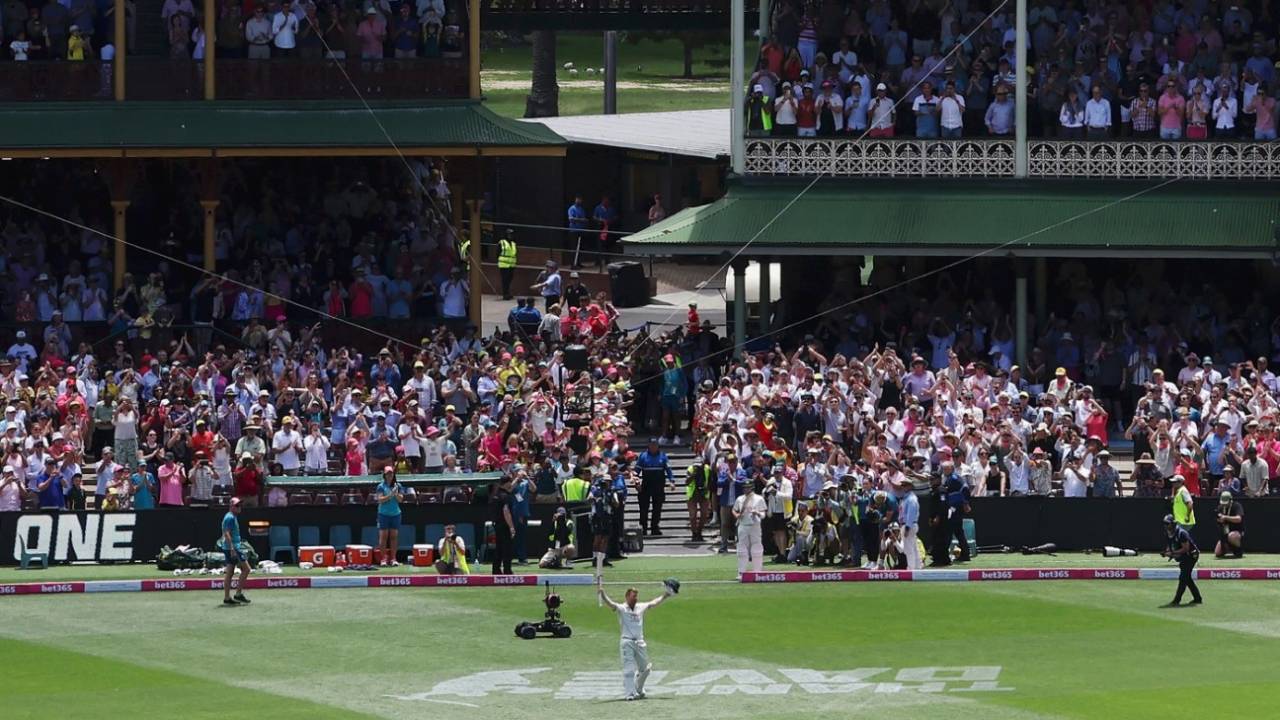Australia vs Pakistan 2023-24
A review of Australia vs Pakistan in 2023-24
Geoff Lemon
David Warner says goodbye to the SCG fans after his last Test innings • Getty Images
Test matches (3): Australia 3 (36pts), Pakistan 0 (-2pts)
Pakistan's arrival in early December was not accompanied by much expectation. After Australia had travelled abroad to win the World Test Championship, retain the Ashes, and claim the one-day World Cup in India, their last assignment for 2023 felt decidedly low-key, against a team who had not so much as drawn a Test in Australia since November 1995, and had won just four in all since their first visit in 1964-65.
By January 2024, the losing streak had grown to 17 after a 3-0 whitewash, yet there was an upbeat air about Pakistan's performance. Though heavily beaten, a team shorn of experience, and under fresh leadership, saw moments of encouragement. Shan Masood, the new captain, promised attacking cricket and confidence. Pakistan had genuine chances to win in Melbourne and Sydney, only to fumble, literally and figuratively. Aamer Jamal - seven years on from a club stint in Sydney, and having worked as a taxi driver in Lahore in the interim - made a splash in his debut series at 27, first with the ball, then increasingly with the bat. And three Tests were an advance from two in 2019-20, Pakistan this time recognised as the southern summer's higher billing opponent (despite what West Indies achieved in Brisbane early in 2024).
This new-look Pakistan were ad hoc, and shaped - as ever - by politics. Star batsman Babar Azam had been pressured to step down after presiding over a poor World Cup, and was replaced by Masood, despite his modest record (a batting average of 28 in 30 Tests over ten years). Mickey Arthur was shunted out of the team director role, with former Test batter Mohammed Hafeez appointed on an interim basis, despite having no coaching credentials. The official head coach, Grant Bradburn, was told to stay at the National Academy in Lahore. Bradburn had been appointed only a few months earlier, but soon resigned to take charge of Glamorgan. Nothing seemed permanent: the national government was in caretaker mode ahead of elections, leaving PCB chairman Zaka Ashraf a caretaker himself.
Hafeez was happy to be the centre of attention, starting with criticism of a lifeless pitch for the warm-up against the Prime Minister's XI in Canberra. Masood did not mind, assembling an unbeaten 201, but the match's main contribution was to wipe out leg-spinner Abrar Ahmed, who aggravated a knee injury while bowling 27 overs. He was one of many absentees. Naseem Shah, half of Pakistan's best pace pair with Shaheen Shah Afridi, remained on the injury list, and did not travel. Haris Rauf declined to tour, preferring a different Australian engagement in the Big Bash League. Left-arm spinner Nauman Ali ended up in hospital with appendicitis, while Khurram Shehzad looked good in Perth but returned home before the Second Test with a rib stress fracture.
Australia could not have been more settled. Recovered from his dramatic Ashes calf injury, Nathan Lyon joined Pat Cummins, Mitchell Starc and Josh Hazlewood to reunite the most durable bowling quartet in Test history - no other attack for a single game have contained four with 200 wickets. They would extend their record for four frontline bowlers playing in the same team to 27 matches. Lyon took his 500th wicket, and the quartet finished the Third Test with 1,361, and Cummins - who collected three successive five-fors, including ten wickets at the MCG - on the verge of becoming the last to tick off 250.
The series became a backdrop for David Warner's impending retirement. He was mischaracterised as having demanded a farewell lap of honour, but had said only he would like to finish at home in Sydney, if picked. He started with 164 at Perth and, after 112 matches over a dozen years, ended in fifth place on Australia's run-list with 8,786, at a strike-rate of 70; no one has scored so many, so quickly, in Tests. Opinion about him remained as divided on departure as in occupation - a player with claims to having been Australia's most controversial cricketer, and to having revolutionised the job of opening.
Meanwhile, his opening partner, Usman Khawaja, took a broader view, tangling with the ICC for protesting about the mass killing of civilians in Gaza by Israel's military. His proposal, to write innocuous statements on his boots about freedom and human rights, was shut down by the governing body, who deemed it unacceptable political speech. Later he was investigated for a black armband. The issue rumbled throughout the series.
